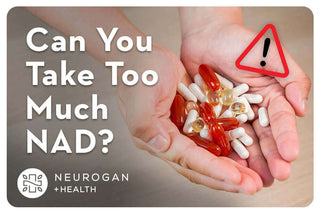NAD, or nicotinamide adenine dinucleotide, is a natural compound that our body produces for metabolic functions, playing roles in energy production and DNA maintenance.
If you take too many NAD supplements, you may experience a mild discomfort, including nausea, brain fog, and minor headaches.
That being said, as we age, our NAD levels begin to decline, which is correlated with signs of aging. We might feel sluggish, recover from stressful events or workouts more slowly, or start noticing that our hair and skin aren't looking as good as they once did.
While research shows that supplementing NAD either directly or with precursor compounds like nicotinamide mononucleotide (NMN), nicotinamide riboside (NR), or NADH can improve NAD pools, excessive intake can lead to negative side effects, including headaches, nausea, flushing, and fatigue.
What Happens If You Take Too Much NAD?
Luckily, the body is quite efficient at regulating our NAD levels (since we already make it), and if you accidentally take too much, the consequences are generally mild and temporary.
For instance, the most common effects of overdosing on NAD supplements include:
-
Nausea
-
Headaches
-
Brain fog
-
Skin flushing
-
Muscle cramping
It's not comfortable, but it's unlikely to cause serious damage or land you in the ER.
If you're taking NAD injectables, you can run into other complications related to injection-site reactions like mild pain, swelling, and infections. In very rare, severe cases, some people have experienced severe chills, shaking, and vomiting.

What Are The Common Causes of Overdosing NAD?
Overdosing on NAD+ or its precursors, such as nicotinamide, NMN, or NR, is not common, but it can happen, especially when people self-administer.
DIY or Unregulated Use of IV or Injectable NAD+
You can find injectable NAD kits online. IV drips aren't as common to purchase online, as most retailers require a clinic license. However, you may encounter a clinic with inexperienced practitioners administering your NAD IV.
When it comes to IV therapy, failure to dilute or infuse the drip too quickly can intensify side effects like nausea, flushing, and chest tightness. It's also important that you get the dosage of your NAD injections right and that the source you purchase from comes with verified purity testing.
Stacking Multiple NAD Precursors Without Realizing It
Another common reason people might accidentally take too much NAD is that they're taking NMN, NR, and high-dose nicotinamide or niacin in supplements or energy drinks, not realizing that these substances all convert into NAD+ in the body.
For example, someone might take an NMN capsule in the morning, a pre-workout with niacin, and a multivitamin with NAM, pushing intake to multi-gram levels daily.
We've also had someone take too many NAD nasal sprays and experience dizziness and nausea.
Taking Ultra High Doses of Oral NAM/NMN Supplements
Going above 2–3 grams a day without monitoring liver enzymes or methylation status. Methylation is needed to convert these precursors into NAD, and it's possible to deplete the body's methyl pools to create NAD, leading to a host of adverse side effects.
More NAD Isn't Always Better
NAD+ is important for energy metabolism, cellular repair, and healthy aging, but taking too much, especially through high-dose supplements or unregulated NAD+ injections, can do more damage than good.
Some of the side effects include nausea, fatigue, liver strain, and disrupted methylation, especially when doses exceed 1–2 grams daily or are stacked without proper guidance.
To safely support your NAD levels:
-
Avoid combining multiple precursors.
-
Use high-quality products from trusted sources that can provide third-party lab tests for purity.
-
Consult with your healthcare professionals if you're using high doses for long-term use to make sure you're maintaining your methylation health.
A lot of the time, people get this wrong by thinking that taking more of a good thing is better, but when it comes to supplementation, maintaining consistency is key.




